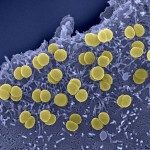Link to Pubmed [PMID] – 30287414
Clin. Microbiol. Infect. 2018 Oct;
OBJECTIVES: The matrix-assisted laser desorption/ionization time-of-flight mass spectrometry (MALDI-TOF MS) technique is increasingly used in hospital laboratories for routine identification of microorganisms. However, its performance is variable, particularly for highly variable species such as Neisseria meningitidis. Reliable identification of N. meningitidis is crucial for the management of invasive meningococcal disease by rapid implementation of treatment and preventive measures among close contacts. We assessed and improved N. meningitidis identification by MALDI-TOF MS by enriching the databases with reference strains identified using whole genome sequencing (WGS) as a reference standard.
METHODS: We first built a collection of 24 strains from several species of the Neisseria genus that we characterized by WGS. This collection was added to the available database to test by MALDI-TOF MS another collection of 32 clinical isolates received between 2015 and 2017 at the French National Reference Laboratory for Meningococci.
RESULTS: Using the commercially available library of mass spectrometry profiles, only 67% (95% confidence interval (CI), 47-82) concordance was observed at the species level between MALDI-TOF MS and WGS characterization. However, when the new enriched reference collection was used on the second subset of isolates, the identification of N. meningitidis was significantly improved (p 0.0016), showing 92% (95% CI, 75-98) specificity while that of the manufacturer’s database alone was 52% (95% CI, 34-70).
CONCLUSIONS: Our data highlight the need to update the available MALDI-TOF MS database with high-quality references to enhance the identification of N. meningitidis and avoid unwarranted preventive measures or missing identification.

